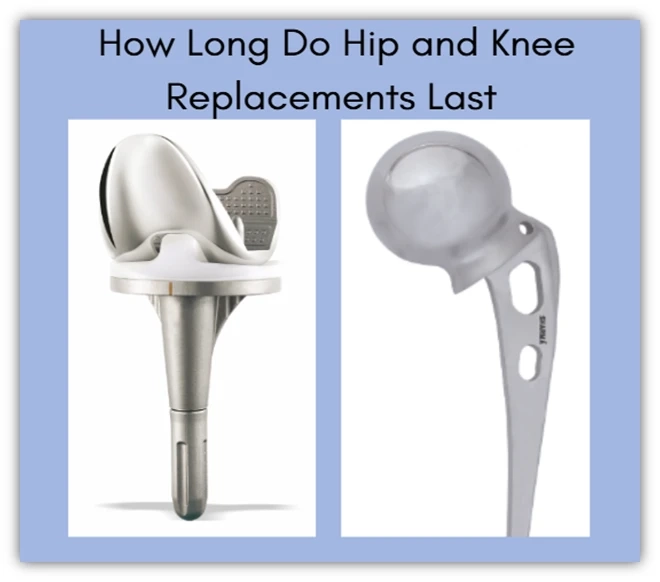Are you considering a joint replacement surgery, or have you already undergone one? Then the most common question in your mind would be – ‘How long will it last?’ It is very common to have this concern in your mind when it comes to your health and quality of life. One must always be aware of what they are getting into before opting for such crucial and critical orthopedic surgeries. This helps you make an informed decision about the treatment, allowing you to have realistic expectations and achieve the desired results. In this blog post, we aim to help you understand the lifespan of a knee or hip replacement implant.
Joint Replacement Implant Longevity Explained
The current-day hip and knee replacement implants are manufactured keeping in mind their durability and sturdiness. However, the real query is – are they long-lasting? Well, the answer to this depends on various factors, such as the material of the implant, the patient’s activity level, the surgeon’s skills, and so on.
Knee Replacement Lifespan
A knee replacement implant has a considerable lifespan of around two decades, which is 15-20 years. Many studies have stated that 85% of the knee replacements manage to function properly even after 15 years. Furthermore, 70% of these continue for 20 years and beyond. The main reason for this implant to last quite long is the patient’s limitation on high-impact activities. Our knee joints experience various types of stress due to the movement patterns and weight load exerted on them. These factors can negatively affect the longevity of a knee replacement implant.
Hip Replacement Lifespan
The majority of the hip replacement implants last much longer than a knee replacement. They can last up to 25 years and beyond. The very recent studies of hip replacement implants mention that 85% to 90% of these patients are comfortable with the implants even after 20 years. The materials used in the manufacturing of these implants have improved over the years.
Newer ceramic-on-ceramic or ceramic-on-plastic implants offer even longer lifespans than traditional metal-on-plastic implants. Some individuals who had high-quality implants have reported functioning well for at least 30 years.
What are the factors that affect the longevity of orthopedic Implants?
Out of many factors, we have included below a list of some of the most commonly visible factors that affect an implant’s shelf life.
1. Activity Level & Lifestyle
The type of physical activity that you engage in determines the lifespan of your replacement implant. If you are involved in high-intensity activities such as long jumps, running, or any contact sports, then this can deteriorate the implant condition. However, if you are limited to jogging, swimming, and cycling, then it helps to preserve the health of your implant and its surrounding muscles.
2. Patient’s Age During Surgery
The younger the patient is, the better the outcome. Younger patients experience long-lasting implants because they are healthy and have better bone quality. But, since they are involved in high-impact sports activities, their implants can wear out earlier. Therefore, the surgeons always recommend that patients who are below 50 years delay their implant surgery, if possible.
3. Body Weight and Height Stats
Increased body weight impacts the lifespan of your implant due to excessive strain and stress on the joint. An orthopedic implant is under a lot of stress when the user is overweight, which can be followed by implant loosening. The longevity of the implant can also be hampered by diabetes, osteoporosis, or any other medical condition.
4. Surgical Skills and Implant Quality
The skill set and experience of the orthopedic surgeon, along with the quality of implants, are also major deciding factors. A lot of modern surgical techniques, such as computer-assisted surgery and better implant designs, have ensured better outcomes for the patients.
What are the Signs for Revision Surgery?
Even though major implants last for decades, in some cases, one might have to consider a revision joint replacement surgery. The important warning signs you must look for are:
● Swelling and inflammation around the joint
● Constant pain around the joint, which gets worse over time
● Knee stiffness and a decrease in range of motion
● Instability in the joint
● Change in the way you walk
If you experience any of the above signs for your joint replacement surgery, consider visiting your orthopedic surgeon for a check-up. Make sure they examine the status of your implant using imaging techniques to confirm the etiology.
Tips to Maximize the Lifespan of a Joint Replacement Implant
● Maintain a Healthy Weight
Make sure to stay within the needle when it comes to managing your weight. It is important to have a healthy weight by following a proper, balanced diet and exercise, which can positively impact your implant’s life.
● Stay Active and Safe
Participate in low-impact exercises to maintain muscle strength and joint flexibility. Activities like swimming, cycling, golf, etc, are the best choices. Do not attempt high-intensity sports that involve sudden changes of stance or long jumps.
● Stick to the Post-Operation Care Strictly
After your surgery, be very religious about the advice and tips that your orthopedic surgeon recommends. Follow your physical therapy program and take your medicines on time to boost proper recovery and long-term success.
● Keep a Check on Infections
Oral hygiene and quick treatment of infection are necessary, as these are the common routes by which bacteria enter your bloodstream.
Role that We at Sharma Orthopedic Play in Orthopedic Implant Longevity
There are constant advancements in material science and surgical techniques that have proven to maximize the longevity of orthopedic implants. New technologies are being devised to ensure better outcomes for patients and long-lasting results. At Sharma Orthopedic, we are committed to creating the latest innovative solutions that maximize the implant durability for patient satisfaction. We believe that every patient deserves access to high-quality implants designed to last.


